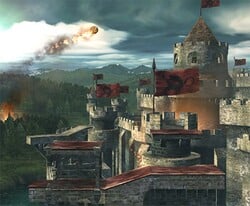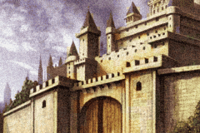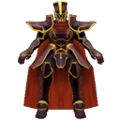Castle Siege: Difference between revisions
(Correcting a few things... The General in the background is not the Black Knight and I don't think the forest fire represents the Serenes Massacre at all, that's more than a bit of a stretch, it's probably just a fireball that went astray.) |
(Adding the image of the General.) |
||
| Line 22: | Line 22: | ||
Throughout the entire [[Fire Emblem (universe)|''Fire Emblem'' series]] the main objective for most chapters is to seize a castle. This is more than likely where the name of this stage came from. Official artwork from the ''Fire Emblem'' games has depicted castles as being immense and often surrounded by forests. The castle of Altea is also depicted similarly in the ''Fire Emblem'' anime. This stage in ''Brawl'' has a castle that designed after various castles in the ''Fire Emblem'' series' artworks and the castle also has some resemblance to the one in the anime. The castle is also surrounded by many forests, as is common in the series (where forest regions provide extra defense for units). Another motif in the throughout the ''Fire Emblem'' series is that many of the villains are that of a dragon race, or use dragons and wyverns commonly in battle. The symbol depicted on the flags in this stage is a dragon. This symbol is particularly similar to the flag of Daein, the main antagonistic nation in ''Fire Emblem: Path of Radiance'', although it shares distinct differences. | Throughout the entire [[Fire Emblem (universe)|''Fire Emblem'' series]] the main objective for most chapters is to seize a castle. This is more than likely where the name of this stage came from. Official artwork from the ''Fire Emblem'' games has depicted castles as being immense and often surrounded by forests. The castle of Altea is also depicted similarly in the ''Fire Emblem'' anime. This stage in ''Brawl'' has a castle that designed after various castles in the ''Fire Emblem'' series' artworks and the castle also has some resemblance to the one in the anime. The castle is also surrounded by many forests, as is common in the series (where forest regions provide extra defense for units). Another motif in the throughout the ''Fire Emblem'' series is that many of the villains are that of a dragon race, or use dragons and wyverns commonly in battle. The symbol depicted on the flags in this stage is a dragon. This symbol is particularly similar to the flag of Daein, the main antagonistic nation in ''Fire Emblem: Path of Radiance'', although it shares distinct differences. | ||
In various ''Fire Emblem'' games, Ballista appear as ranged weapons. Specific | In various ''Fire Emblem'' games, Ballista appear as ranged weapons. Specific varieties known as Hoistflamme (ファイアーガン, Fire Gun) and Pachyderm (エレファント, Elephant) are used by a class known as Ballisticians in ''Fire Emblem: Ankoku Ryū to Hikari no Tsurugi'', ''Fire Emblem: Monshou no Nazo'' and ''Fire Emblem: Shadow Dragon''. These are projectile weapons that launch flaming or explosive missiles at their targets. The weapons in the background of the stage are presumably similar, but are described as catapults, and are launching fireballs rather than explosives. Catapult weapons are known as Stonehoist (ストーンヘッジ, Stone Hedge) or Onagers in ''Fire Emblem: Radiant Dawn'', although they do not specifically fire fireballs in the games. | ||
This stage depicts a large knight sitting on the throne in the background of the stage. The sprite for this knight is known as "gene_10" in the code of the game, a shortened version of "General". Many of the major chapters in the ''Fire Emblem'' series happen indoors where the protagonist is trying to seize the throne that is usually guarded by a powerful boss. This boss is usually a powerful class such as a General, which is a slow unit with high defensive and offensive capabilities. The first castle interior chapter in ''Fire Emblem: Ankoku Ryū to Hikari no Tsurugi'', the original Fire Emblem game, included a General (then known as しょうぐん, Shogun) called Emereus as a boss on the throne. This General also bears a strong resemblance to the Black Knight, a very prominent character in ''Fire Emblem: Path of Radiance'' and ''Fire Emblem: Radiant Dawn'' and is a deadly rival to [[Ike]]. The Black Knight was also a General class in ''Path of Radiance'', but there are significant differences in the design of this General and the Black Knight. | This stage depicts a large knight sitting on the throne in the background of the stage. The sprite for this knight is known as "gene_10" in the code of the game, a shortened version of "General". Many of the major chapters in the ''Fire Emblem'' series happen indoors where the protagonist is trying to seize the throne that is usually guarded by a powerful boss. This boss is usually a powerful class such as a General, which is a slow unit with high defensive and offensive capabilities. The first castle interior chapter in ''Fire Emblem: Ankoku Ryū to Hikari no Tsurugi'', the original Fire Emblem game, included a General (then known as しょうぐん, Shogun) called Emereus as a boss on the throne. This General also bears a strong resemblance to the Black Knight, a very prominent character in ''Fire Emblem: Path of Radiance'' and ''Fire Emblem: Radiant Dawn'' and is a deadly rival to [[Ike]]. The Black Knight was also a General class in ''Path of Radiance'', but there are significant differences in the design of this General and the Black Knight. | ||
| Line 28: | Line 28: | ||
Soldiers wearing red armor appear throughout the indoor area. The opposing armies in Fire Emblem games traditionally wear red armor. These soldiers wear full body armor and wield swords. The design of these soldiers is similar to that of enemy Knight units in ''Path of Radiance'', and various soldiers seen in the Begnion army in ''Fire Emblem: Radiant Dawn''. Armor Knights very rarely wield swords, and usually use lances, so it is also possible that they represent dismounted Cavaliers. | Soldiers wearing red armor appear throughout the indoor area. The opposing armies in Fire Emblem games traditionally wear red armor. These soldiers wear full body armor and wield swords. The design of these soldiers is similar to that of enemy Knight units in ''Path of Radiance'', and various soldiers seen in the Begnion army in ''Fire Emblem: Radiant Dawn''. Armor Knights very rarely wield swords, and usually use lances, so it is also possible that they represent dismounted Cavaliers. | ||
''Fire Emblem: Genealogy of Holy-War'' was the first ''Fire Emblem'' to feature a background during conversations. One of the backgrounds resembles the entire indoor room of this stage. ''Fire Emblem: The Binding Blade'' was the first ''Fire Emblem'' to have destructible terrain. For example, a wall has a certain amount of HP when the player attacks the wall enough to where the | ''Fire Emblem: Genealogy of Holy-War'' was the first ''Fire Emblem'' to feature a background during conversations. One of the backgrounds resembles the entire indoor room of this stage. ''Fire Emblem: The Binding Blade'' was the first ''Fire Emblem'' to have destructible terrain. For example, a wall has a certain amount of HP when the player attacks the wall enough to where the HP reaches zero the wall crumbles. The statues in this stage could be a reference to the destructible material. | ||
''Fire Emblem: Fuuin no Tsurugi'' introduced stages that exist in underground areas surrounded by manga. Ever since ''Fuuin no Tsurugi'', with the exception of ''Path of Radiance'', there has been an underground stage filled with lava. The last area of this stage in ''Brawl'' is designed to represent one of these areas. | ''Fire Emblem: Fuuin no Tsurugi'' introduced stages that exist in underground areas surrounded by manga. Ever since ''Fuuin no Tsurugi'', with the exception of ''Path of Radiance'', there has been an underground stage filled with lava. The last area of this stage in ''Brawl'' is designed to represent one of these areas. | ||
| Line 50: | Line 50: | ||
Image:CastleSiege-FirstFloor-LavaLevel.jpg|Marth and Ike on the underground tier. | Image:CastleSiege-FirstFloor-LavaLevel.jpg|Marth and Ike on the underground tier. | ||
Image:CastleSiege-LavaLevel-Overview.jpg|The background of the underground tier. | Image:CastleSiege-LavaLevel-Overview.jpg|The background of the underground tier. | ||
Image:gene_10.png|The General's sprite, seen on the throne in the background of the stage. | |||
</gallery> | </gallery> | ||
Revision as of 14:32, May 14, 2012
| Castle Siege | |
|---|---|
 File:FireEmblemSymbol.png | |
| Universe | Fire Emblem |
| Appears in | SSBB |
| Availability | Starter |
| Crate type | Normal |
| Tracks available | Fire Emblem Theme With Mila's Divine Protection (Celica Map 1) Attack Preparing to Advance Winning Road - Roy's Hope Shadow Dragon Medley Ike's Theme Against the Dark Knight Crimean Army Sortie Power-Hungry Fool Victory is Near Fire Emblem (Melee) Bolded song must be unlocked |
Unveiled at E3 2006, Castle Siege is a Fire Emblem stage in Super Smash Bros. Brawl based upon themes and motifs from the series as a whole, rather than one particular title, due to the stage not resembling any game of the series.
When the match begins, players begin the fight on a small section of the unnamed castle's roof, which is bombarded by heavy fire from catapults. Eventually the floor shatters as the castle defenses waver and players fall into the throne room, which has breakable statues, four platforms and a solid floor with no drop-off points. Two platforms are held in place by destructible statues. There are also two hanging cloth emblems above serving as platforms. Players later fall again into the underground, which contains one stone platform balancing on a stone spire in the midst of a lava cavern. A part of this area is slightly elevated. After a while the stage will transition back to the top of the castle.
Origin
Throughout the entire Fire Emblem series the main objective for most chapters is to seize a castle. This is more than likely where the name of this stage came from. Official artwork from the Fire Emblem games has depicted castles as being immense and often surrounded by forests. The castle of Altea is also depicted similarly in the Fire Emblem anime. This stage in Brawl has a castle that designed after various castles in the Fire Emblem series' artworks and the castle also has some resemblance to the one in the anime. The castle is also surrounded by many forests, as is common in the series (where forest regions provide extra defense for units). Another motif in the throughout the Fire Emblem series is that many of the villains are that of a dragon race, or use dragons and wyverns commonly in battle. The symbol depicted on the flags in this stage is a dragon. This symbol is particularly similar to the flag of Daein, the main antagonistic nation in Fire Emblem: Path of Radiance, although it shares distinct differences.
In various Fire Emblem games, Ballista appear as ranged weapons. Specific varieties known as Hoistflamme (ファイアーガン, Fire Gun) and Pachyderm (エレファント, Elephant) are used by a class known as Ballisticians in Fire Emblem: Ankoku Ryū to Hikari no Tsurugi, Fire Emblem: Monshou no Nazo and Fire Emblem: Shadow Dragon. These are projectile weapons that launch flaming or explosive missiles at their targets. The weapons in the background of the stage are presumably similar, but are described as catapults, and are launching fireballs rather than explosives. Catapult weapons are known as Stonehoist (ストーンヘッジ, Stone Hedge) or Onagers in Fire Emblem: Radiant Dawn, although they do not specifically fire fireballs in the games.
This stage depicts a large knight sitting on the throne in the background of the stage. The sprite for this knight is known as "gene_10" in the code of the game, a shortened version of "General". Many of the major chapters in the Fire Emblem series happen indoors where the protagonist is trying to seize the throne that is usually guarded by a powerful boss. This boss is usually a powerful class such as a General, which is a slow unit with high defensive and offensive capabilities. The first castle interior chapter in Fire Emblem: Ankoku Ryū to Hikari no Tsurugi, the original Fire Emblem game, included a General (then known as しょうぐん, Shogun) called Emereus as a boss on the throne. This General also bears a strong resemblance to the Black Knight, a very prominent character in Fire Emblem: Path of Radiance and Fire Emblem: Radiant Dawn and is a deadly rival to Ike. The Black Knight was also a General class in Path of Radiance, but there are significant differences in the design of this General and the Black Knight.
Soldiers wearing red armor appear throughout the indoor area. The opposing armies in Fire Emblem games traditionally wear red armor. These soldiers wear full body armor and wield swords. The design of these soldiers is similar to that of enemy Knight units in Path of Radiance, and various soldiers seen in the Begnion army in Fire Emblem: Radiant Dawn. Armor Knights very rarely wield swords, and usually use lances, so it is also possible that they represent dismounted Cavaliers.
Fire Emblem: Genealogy of Holy-War was the first Fire Emblem to feature a background during conversations. One of the backgrounds resembles the entire indoor room of this stage. Fire Emblem: The Binding Blade was the first Fire Emblem to have destructible terrain. For example, a wall has a certain amount of HP when the player attacks the wall enough to where the HP reaches zero the wall crumbles. The statues in this stage could be a reference to the destructible material.
Fire Emblem: Fuuin no Tsurugi introduced stages that exist in underground areas surrounded by manga. Ever since Fuuin no Tsurugi, with the exception of Path of Radiance, there has been an underground stage filled with lava. The last area of this stage in Brawl is designed to represent one of these areas.
Stage Changes
The "changing stage" effects of Castle Siege occur at regular intervals. For example, the initial siege setting lasts until approximately 40 seconds into the match. These changes can have the effect of saving a character who would have been otherwise unable to recover. This is particularly useful for Bowser players attempting a stalled Flying Slam or Ganondorf players attempting a stalled aerial Flame Choke, among others.
Trivia
- Pokémon Trainer stands in the little parapet on the right when he's on the first tier of the stage; if there are 3 or 4 Pokémon Trainers, 2 will stand in the little parapet on the right, while the others will stand in the little parapet in the background.
- Pausing the game while the stage is going through a transition will end the transition quickly, since the game continues to load the stage as the game is paused. A similar effect happens with special moves that involve character switching.
- If a match on Castle Siege goes into Sudden Death, it will begin on whichever tier the match ended on, not necessarily the top level. This is likely done so the game doesn't have to reload the top level before Sudden Death.
Gallery
- CastleSiegeTier.jpg
Yoshi, Donkey Kong, Ike and Zero Suit Samus on the middle tier.
- CastleStatue.jpg
Donkey Kong destroys one of the statues.
External Link
|
| |
|---|---|
| Fighters | Marth (SSBM · SSBB · SSB4 · SSBU) · Roy (SSBM · SSB4 · SSBU) · Ike (SSBB · SSB4 · SSBU) · Lucina (SSB4 · SSBU) · Robin (SSB4 · SSBU) · Corrin (SSB4 · SSBU) · Chrom (SSBU) · Byleth (SSBU) |
| Assist Trophies | Lyn · Black Knight · Tiki |
| Stages | Castle Siege · Arena Ferox · Coliseum · Garreg Mach Monastery |
| Item | Killing Edge |
| Other | Sothis |
| Trophies, Stickers and Spirits | Trophies (SSBM · SSBB · SSB4) · Stickers · Spirits |
| Music | Brawl · SSB4 · Ultimate |
| Masterpieces | Fire Emblem: Shadow Dragon and the Blade of Light · Fire Emblem: Mystery of the Emblem |







